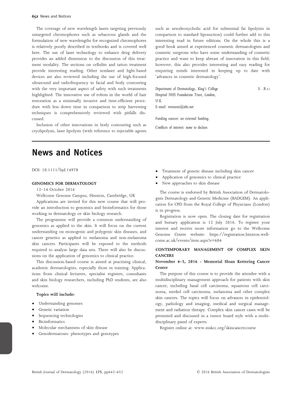News and Notices: Advancements in Cosmetic Dermatology
September 2016
in “
British Journal of Dermatology
”

TLDR The document discusses new cosmetic dermatology technologies, safety, robotic hair restoration, and upcoming courses on genomics and skin cancer management.
The document provides an overview of advancements in cosmetic dermatology, highlighting new laser technologies targeting sebaceous glands, enhanced drug delivery through lasers, and non-laser treatments like high-focused ultrasound and radiofrequency for facial and body contouring. It emphasizes the importance of safety in these treatments and reviews the use of robots in hair restoration as a less invasive and more efficient alternative to traditional methods. The document also mentions the potential inclusion of other body contouring innovations like cryolipolysis and laser lipolysis in future discussions. Additionally, it announces a new course on genomics for dermatology, covering topics such as genetic skin diseases and the application of genomics in clinical practice, aimed at dermatologists and skin biology researchers. Furthermore, it advertises a course on the management of complex skin cancers, focusing on a multidisciplinary approach and recent advances in the field. The document is intended for experienced cosmetic dermatologists and surgeons, as well as those interested in the latest developments in cosmetic dermatology.



